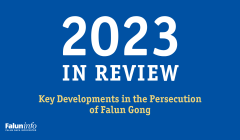The Persecution of Falun Gong: Key Developments in 2023

Even after nearly a quarter century of persecution, Falun Gong practitioners continue to be a prime target of Chinese security forces and to face large-scale abuses, including arbitrary detention, imprisonment after sham trials, systematic torture, and death. Each year, there are emerging trends and evolving tactics in how this persecution is carried out, as well as how actors within China and globally are responding.
The following are six key developments from 2023:
1. The Chinese Communist Party is doubling down on its anti-Falun Gong campaign
Although the regime’s campaign to wipe out Falun Gong has been ongoing since 1999, in 2023 officials from the CCP’s security and propaganda apparatus noticeably and publicly renewed their prioritization and attention to maligning and persecuting Falun Gong practitioners.
This trend has been evident for several years as CCP leaders at the national and local level cite the crackdown on Falun Gong as a top priority for safeguarding the “political security” of the regime. Researchers at the Falun Dafa Information Center found over twenty such references from at least 12 provinces dated since 2017, as well as from work reports, speeches, and directives by top judicial and public security officials at the national level.
The research also found that official references to targeting Falun Gong have become increasingly public, as evidenced by comments made as recently as early 2023, marking a departure from years of silence by public security officials, even as the persecution continued unabated throughout the country during that time.
It is notable that this phenomenon has continued even after the November 2022 death of Jiang Zemin, the former CCP leader who launched the ban and violent persecution against Falun Gong in 1999. Moreover, such rhetoric elevating Falun Gong as a target for repressive security operations has correlated to intensified persecution observed by the Falun Dafa Information Center since the beginning of the COVID-19 pandemic, including large-scale arbitrary detention, torture, and deaths from abuse in custody.
It has also translated into a massive propaganda campaign launched in spring of 2023, whereby millions of Chinese citizens are incentivized or forced to review demonizing and false videos and other content about Falun Gong, as well as to sign a petition claiming they support the persecution. The nationwide campaign—which deploys the ubiquitous WeChat app to house a petition and grant “badges” to signatories—is referenced on government websites throughout the country. Various state and party institutions have been recruited into its implementation, including the police force, Public Security Bureaus, neighborhood and municipal CCP committees, and village committees. Elementary, middle, and high schools have also been a key target of the effort, an example of the regime trying to indoctrinate the next generation of Chinese people to hate and fear Falun Gong.
2. More Falun Gong practitioners were arrested and sentenced for practicing their faith and engaging in grassroots dissent compared to 2022
Chinese police are known to have arrested 3,629 Falun Gong practitioners in 2023, although the actual scale of detentions is certainly larger, given the regime’s tight censorship on such reported incidents. This represents an increase compared to 2022 (3,305 at the time of writing).
After being detained, hundreds of Falun Gong practitioners each year are formally prosecuted and sentenced to prison following sham trials and long pre-trial detention. This too was the case in 2023.
A total of 615 Falun Gong practitioners are known to have been sentenced to prison terms of up to 12 years, while another 140 more were reported and are believed to have occurred in 2023. This represents an overall increase from the total of sentences imposed on Falun Gong practitioners in 2022. Given the delay in reporting, the increase in cases is likely even higher; only 446 out of the 659 sentences that occurred in 2022 had been reported by this time last year.
These new prisoners of conscience join an estimated tens of thousands—or even more—other Falun Gong practitioners being held in police stations, extralegal detention facilities, and prisons. One factor that may have contributed to the uptick in 2023 was the December 2022 end of the Chinese government’s zero-COVID policy and its accompanying lockdowns, both of which also reduced activity in the judicial system during that year.
Analysis of the cases indicates that many jailed Falun Gong practitioners have been targeted simply for practicing their faith and exercising their right to religious freedom. During 2023, hundreds of Falun Gong practitioners were arrested or sentenced for gathering together to read Falun Gong teachings or for possessing Falun Gong spiritual texts. For example, on September 4, police conducted a mass arrest of over 50 Falun Gong practitioners in Heilongjiang Province after security forces monitored gatherings.
But an even larger proportion of detained Falun Gong practitioners have been punished for engaging in various forms of dissent and exercising their right to free expression. Practitioners throughout China have responded to the CCP’s persecution, censorship, and propaganda with grassroots efforts to educate the Chinese people about rights violations and at times, to file legal complaints about torture and other abuses they have suffered. For this, many have faced renewed detention, sentencing, and imprisonment.
Thus, in 2023, many victims were sentenced for sharing information on censored topics, writing to officials urging them not to participate in the persecution of Falun Gong, distributing information materials in public and residential areas, or simply speaking to other Chinese citizens about Falun Gong, the persecution, the CCP’s brutal history, or COVID-19.
3. Chinese police are weaponizing surveillance and engaging in nationwide harassment
The regime’s increasingly sophisticated digital surveillance tools are contributing to practitioners’ detection—and subsequent detention and imprisonment. In 54 documented cases since November 2022, Falun Gong practitioners were detained after China’s pervasive video surveillance cameras recorded them talking to people in parks or markets about the persecution, hanging posters in public spaces, or distributing leaflets in residential areas. At least one Chinese technology firm has also developed an alarm feature for police that specifically targets Falun Gong believers.
But even absent high-tech surveillance, the regime has created a nationwide apparatus of grassroots monitoring and harassment that targets Chinese citizens suspected of practicing or speaking about Falun Gong. In 2023, a total of 2,885 practitioners were documented to have been harassed by police via home visits, warrantless searches, physical monitoring, or financial extortion.
During the year, intensified harassment occurred surrounding political sensitive dates and events, as is often the case. At the national level, this included annual meetings of China’s rubber stamp legislature in Beijing in March, as well as anniversaries more specific to Falun Gong in April, May, and July. More localized events—such as a May visit to Shaanxi province by CCP leader Xi Jinping—also triggered intensified harassment, monitoring, and persecution of local residents who practice Falun Gong.
4. In 2023, the number of Falun Gong practitioners documented to have died from persecution surpassed 5,000, with at least 114 deaths occurring during the year
Once detained, Falun Gong practitioners in China face egregious torture, at times leading to death in custody or shortly after release. In a tragic milestone, in June 2023, the total number of Falun Gong believers documented to have died due to persecution surpassed 5,000. As of the time of writing, the total of documented Falun Gong deaths due to persecution since July 1999 had reached 5,032, as recorded by Minghui.org. The actual number of those killed for practicing Falun Gong is believed to be many times larger, reflecting the difficulty of obtaining detailed information, including for countless victims targeted for organ harvesting.
At least 114 of these cases occurred in 2023, according to information recorded by the Minghui.org network of citizen journalists and then transmitted overseas. This count is expected to rise in the coming months given the typical lag in reporting created by the CCP’s tight censorship over such information. The deaths took place in 21 different provinces, municipalities, or autonomous regions. The provinces with the most deaths were Jilin with 14, Liaoning with 12, and Hubei with 12.
The practitioners who passed away in 2023 due to the CCP’s persecution included teachers, physicians, and salesmen. Of the deceased practitioners whose genders are known, 40 were male while 74 were female. Their ages ranged from 31-years-old to 93-years-old. The youngest practitioner was Mr. Jiang Yong, age 31, who was serving an 8.5-year prison term in Jilin Province for “subversion of state power” following his arrest in June 2021. Personnel at Changchun City Gongzhuling Prison tortured Mr. Jiang while he was on a hunger strike and denied family members’ pleas to release him on medical parole. He died in the Changchun City Police Hospital on January 23, an incident which was also reported by the Weiquanwang grassroots human rights network.
Alongside these documented deaths, serious concerns remain that Falun Gong prisoners of conscience are being targeted for organ harvesting, the forcible killing of practitioners to fuel China’s booming organ transplant industry. In addition to medical research published in 2022, cases continued to emerge during 2023 of detained practitioners being subjected to involuntary and suspicious medical testing and examinations, a well-documented pre-cursor to organ harvesting. Detained practitioners reported having saliva and blood samples taken, as well as being subject to iris scans, electrocardiograms, and x-rays. For example, after police in Guangdong province arrested 56-year-old Ms. Yu Mei, medical staff at Chikan District Hospital reportedly collected her blood samples and forced her to have an electrocardiogram and x-rays taken. Ms. Yu had no existing medical conditions, reinforcing suspicions that the exams were a form of pre-screening her to be a potential involuntary organ donor under the CCP’s vast organ harvesting scheme.
5. The CCP’s repression is targeting Falun Gong practitioners abroad, even as democratic governments respond more seriously
The CCP’s pursuit of Falun Gong practitioners extends far beyond China’s borders. In 2021, Freedom House found that the Chinese regime engages in the “most sophisticated, global, and comprehensive campaign of transnational repression in the world” and that among its targets are Falun Gong practitioners. Indeed, the party and its proxies have been carrying out a campaign of transnational repression against Falun Gong for over two decades, expanding and refining the tactics, mechanisms, and apparatus that today target a far wider array of victim communities.
Such attacks continued in 2023, with three key dimensions standing out.
- First, Chinese individuals backed by the regime or deceived by its propaganda engaged in physical and verbal attacks against Falun Gong practitioners who were holding peaceful protests against the CCP and its persecutory campaign. In Brussels, a woman verbally abused practitioners to such an extent that police thought she was mentally unstable. During Xi Jinping’s visit to San Francisco in November for the Asia-Pacific Economic Cooperation (APEC) summit, Chinese individuals believed to have been paid by the regime swarmed in front of Falun Gong banners with enormous Chinese national flags and at least one young man tried to tear down a banner. Also during 2023, in the United States, Canada, Australia, and the United Kingdom, at least five individuals faced charges for physically assaulting Falun Gong practitioners who were raising awareness about the persecution or criticizing the CCP. Several of the cases concluded with the individual apologizing, paying a fine, or receiving other punishment from judicial authorities.
- Second, Twitter accounts and non-profit websites engaged in documenting and publicizing information about the CCP’s persecution of Falun Gong faced coordinated attacks by trolls or denial of service cyberattacks, at times corresponding to the release of particularly potent reports.
- Third, the CCP continues to target Shen Yun Performing Arts, a U.S.-based non-profit, with an aggressive global campaign to coerce theaters and cities not to host its shows, while simultaneously targeting the public with a multi-layered disinformation campaign. Internal CCP documents cite the effort as “an important part of the…struggle against Falun Gong.” In a recent report on the regime’s drive to stop Shen Yun, the Falun Dafa Information Center analyzed 135 incidents in 38 countries of harassment, sabotage, disinformation, and physical attacks by Chinese officials and their proxies that had targeted Shen Yun since 2007; the dataset included eight incidents that occurred in 2023, notably in the Dominican Republic and South Korea.Moreover, during the year,the training facilities for Shen Yun in New York faced incidents of vandalism, frequent spying via drones, frivolous lawsuits, and threats of potential gun violence.
As noteworthy as these assaults on Falun Gong abroad have been, the strong action taken by democratic governments to unveil and punish these attacks over the past two years has been just as significant. During 2023, a total of four suspected Chinese agents were arrested by the U.S. government for their complicity in the CCP’s transnational repression campaign against Falun Gong in the United States. In the most notable incident, in May 2023, two men were arrested for attempting to bribe an IRS official to remove the tax-exempt status of a Falun Gong-related NGO in the United States, presumably Shen Yun Performing Arts. As it turned out, the presumed official was actually an undercover FBI agent.
But resistance to the CCP’s transnational persecution often takes more mundane forms. The above research report published this month found that in 43 incidents in 19 countries since 2007, local theater managers and government officials have rebuffed Chinese diplomats’ attempts to slander Falun Gong and get a Shen Yun performance cancelled. This was despite the CCP’s representatives using intimidation, economic coercion, and other aggressive tactics.
6. Dissent in China thrives as international advocacy scores victories
Despite the CCP’s massive investment in crushing the practice, Falun Gong survives—and even thrives—in China and globally, bringing health, hope, and peace of mind to tens of millions of people. In China, rights lawyers courageously represent Falun Gong clients, colleagues display kindness, and even some police are sympathetic. Around the world, ordinary citizens and government leaders condemn the persecution and have imposed sanctions on Chinese officials. Today, Falun Gong is practiced in more than 100 countries, including by many non-Chinese in places like Togo, Israel, France, or India, although the main body of practitioners is in China.
Millions of Falun Gong believers throughout China continue to print and disseminate underground leaflets and banners countering CCP propaganda and exposing abuses, discretely speak to acquaintances, and share tools for jumping the so-called “Great Firewall” so that fellow citizens can access uncensored information about Falun Gong and other topics.
Practitioners overseas make phone calls to police, prosecutors, and judges, urging them not to participate in the persecution and informing them about foreign sanctions imposed on higher officials. They and others introduce the concept of Tuidang, or “quitting the CCP,” a reference to renouncing (often with an alias) one’s affiliation to the party, its Youth League or Young Pioneers. These efforts are yielding results. Hundreds of millions of Chinese people have published a Tuidang statement, distancing themselves from the CCP and its brutality. Reports from China occasionally include accounts of judges or officers expressing sympathy for practitioners and a reluctance to harm them, sometimes referring to calls from overseas having changed their view of the practice.
Also around the world, relatives of those detained in China raise awareness, advocate for their release, and often gain support from elected representatives and foreign governments. In 2023, among other actions, members of the U.S. Congress hosted a Congressional briefing highlighting the plight of these families, multiple representatives wrote to the U.S. State Department urging them to raise their constituents’ cases with Chinese counterparts, and a former Italian official published an op-ed urging the release of the relative of a European resident. At least one such case ended happily in 2023, when Yolanda Yao was reunited with her parents in California. The elderly couple had been jailed in China from 2015 to 2020 for possessing materials and calendars about Falun Gong and the persecution. They fled the country after facing intense harassment following their release.
More broadly, legislative bodies have been deliberating and adopting resolutions and legislation aimed at ending the persecution of Falun Gong. In Taiwan, several cities including Taipei, Tainan, and Kaohsiung passed resolutions raising awareness about organ harvesting from Falun Gong prisoners and calling for measures to disincentivize patients from traveling to China for transplants.
In the United States, two pieces of national legislation were introduced in 2023. The bi-partisan Stop Forced Organ Harvesting Bill, introduced in February, was passed by the House of Representatives on March 27 with a 413-to-2 vote. Its Senate companion bill remains pending in the Committee on Foreign Relations. The bipartisan Falun Gong Protection Act, re-introduced in June, has accrued 17 co-sponsors and is pending a vote in the House. If adopted, the two bills would impose sanctions on perpetrators (individuals and entities) involved in forced organ harvesting of Falun Gong practitioners and other prisoners of conscience.
At the state level, a bicameral, bipartisan effort passed in the Texas Legislature came into effect on September 1 and aims to end health insurance coverage of organ transplants in countries known to have forced organ harvesting, including China. Indeed, the bill affirms that “organs [in China] may have been harvested from hundreds of thousands of incarcerated people, mainly Falun Gong practitioners.” The bill was signed into law on June 18, and marks the first legislation in the United States to enact complicity prevention measures for American patients.
Looking ahead to 2024
July 20, 2024 will mark 25 years since Jiang Zemin and the CCP launched the violent campaign to wipe out Falun Gong. At the time, Jiang called for Falun Gong to be eradicated within three months. He never expected the faith group to survive in the face of the regime’s onslaught and to even outlive his own lifespan. Clearly, he was wrong.
As the CCP’s security apparatus approaches this anniversary, it has come to terms with this failure in the only way it knows how—not by admitting to its mistakes, but rather by further intensifying repression. Moreover, as the regime seeks to counter the public education efforts of Falun Gong practitioners, the regime is refocusing on spreading falsehoods and disinformation about the practice and successful entities established by practitioners, like Shen Yun Performing Arts. This is taking place both inside and outside of China.
In the coming year, observers should watch for new Chinese government directives on official websites that urge vigilance and increase monitoring of local Falun Gong practitioners ahead of the 25th anniversary of the launch of the persecution in July, as well as the anniversary of a peaceful appeal held by believers in Beijing in April 1999. As breaking news events unfold in China, watch also for Falun Gong practitioners being targeted for sharing uncensored information, including on subjects unrelated to the persecution, as occurred at the height of the COVID-19 pandemic.
Beyond China’s borders, watch for renewed and sophisticated efforts to spread false claims about Falun Gong’s beliefs and the practitioner community, including via use of artificial intelligence (AI) generated imagery, fake social media accounts, paid inserts, or misleading reports in mainstream Western media.
On a more positive note, watch for government officials and other prominent individuals around the world continuing to stand up against the regime’s efforts to silence support for Falun Gong. As the 25th anniversary of the persecution approaches, expect to see additional expressions of solidarity with persecuted practitioners, prosecution of CCP agents engaged in transnational repression, and hearings or legislative initiatives to raise awareness about the plight of Falun Gong practitioners or to mitigate their suffering.
From this perspective, the year 2024 has already gotten off to a strong start. On January 18, the European Union parliament adopted an unprecedented resolution focusing solely on Falun Gong. It called for an end to the persecution, imposition of sanctions on CCP officials responsible for rights abuses, and the release of Ding Yuande, father of a German resident.
May the rest of 2024 bring more good news.








